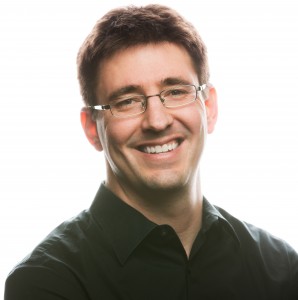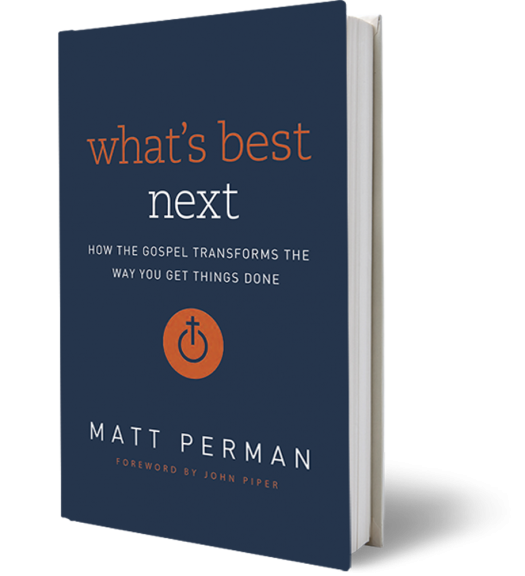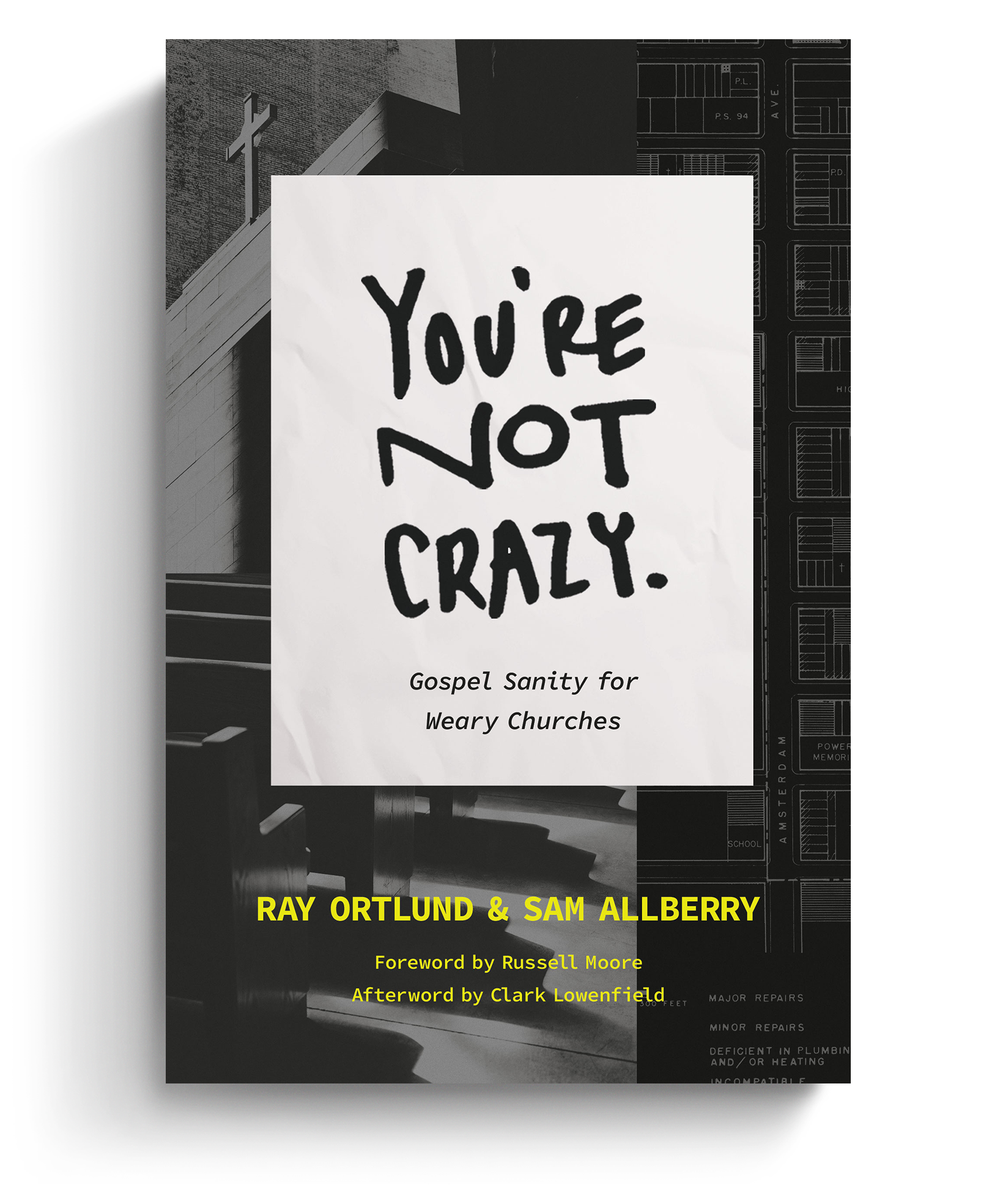 Matt Perman is former director of strategy at Desiring God and author of What’s Best Next: How the Gospel Transforms the Way You Get Things Done. He blogs at www.whatsbestnext.com.
Matt Perman is former director of strategy at Desiring God and author of What’s Best Next: How the Gospel Transforms the Way You Get Things Done. He blogs at www.whatsbestnext.com.
What is What’s Best Next about?
What’s Best Next is a book on how to be productive and get things done from a gospel-centered perspective. In one sense, it’s like David Allen’s Getting Things Done, but within a Christian worldview.
I say “in one sense” because I didn’t just restate Getting Things Done with a few Bible verses added on. That would have been quite lame! While I love GTD, I talk about my own struggles with it and lay out an updated approach that I’ve found to be simpler—while affirming all of the massive good in GTD and its basic framework.
Most importantly, this approach is based in an explicitly Christian worldview so that we can understand the great meaning in our work and have a vision for why productivity even matters at all. Then, within that framework, I give a practical approach for increasing our productivity in every area of life.
Why did you write this book?
There are a few reasons. First, being productive is something all of us have to deal with every day. Nobody is exempt from dealing with multiple, competing demands on their time and having to figure out how to manage it all. There are lots of books on getting things done per se. But there’s almost nothing out there on how to get things done and manage ourselves from a biblical perspective. That is a massive gap because, as Christians, we are called to think about all of life, not just some of life, from a biblical worldview. So I wrote this book to help fill this gap.
The second reason is that I want to reshape the way we think about productivity altogether. Years ago I read Tim Ferriss’ very helpful book The 4-Hour Workweek. His book gives some of the best productivity tips of recent years, but he puts them toward the wrong purpose: minimizing the time you spend working so you can join the “new rich” and live however you want. (Its subtitle is: “Escape 9-5, Live Anywhere, and Join the New Rich”.)
So I said to myself, “What if, instead of putting productivity within the context of joining the new rich, we put productivity within the context of fulfilling God’s vision for our lives?” That is a much more exciting thing, in my view, than joining the new rich and being able to do whatever you want. That’s why the first few sections of the book are about God’s vision for our lives and why we should care about productivity at all. I seek to show both what that vision is and that it is the most exciting and interesting way to live.
 What do you mean by “God’s vision for our lives”?
What do you mean by “God’s vision for our lives”?
God’s vision for our lives is that we glorify him by doing good for others radically, creatively, and abundantly. That’s simply the second greatest commandment: “Love your neighbor as yourself.” We love ourselves creatively and abundantly and, therefore, we are to love others creatively and abundantly as well. The energy and initiative that we put into advancing our own welfare we are to also put into advancing the welfare of others. We are to see our entire lives as avenues for doing good. You don’t have to run to the hills or escape 9-5 to have a meaningful life. You can have the highest possible significance in your work right now—whatever you are doing—if you do it for the good of others and glory of God.
This is where What’s Best Next ties in with books like John Piper’s Don’t Waste Your Life or David Platt’s Radical. I love those books because they cast a compelling vision for how the Scriptures call us to live—namely, to spend ourselves radically for the good of others and glory of God. But those books don’t go into much detail on how to do this—especially in the midst of our complex, super busy lives (and, of course, that’s not their intent).
What’s Best Next, then, seeks to cast a similar vision, but then goes the extra step of giving us practical instruction on how to get things done effectively in the service of God’s vision for our lives. Thus, in addition to talking about the why of our productivity, I also seek to give best-in-class productivity guidance on how to set up your week, get your email inbox to zero every day, delegate in a way that empowers people, overcome procrastination, deal with interruptions, and handle all sorts of other practical things.
If you could highlight just one piece of productivity advice from the book, what would it be?
Put first things first, and do one thing at a time.
Often, we think we can multi-task and do multiple things at once. But in reality, the most productive people choose the single most important task they can be doing at that moment and then focus on it single-mindedly until they are done. When they are done with that task, they might check their email or text messages as a way of staying on top of the new input and re-energizing themselves. But as soon as possible after that, they then choose the next most important task and work on that all the way to completion.
I’m not saying that there should be no exceptions to this. But it is the foundational guideline for effectiveness. By working in this way, you actually get more done, not less, because you are able to get in the zone and reduce the amount of time that your tasks actually take.
Are You a Frustrated, Weary Pastor?
 Being a pastor is hard. Whether it’s relational difficulties in the congregation, growing opposition toward the church as an institution, or just the struggle to continue in ministry with joy and faithfulness, the pressure on leaders can be truly overwhelming. It’s no surprise pastors are burned out, tempted to give up, or thinking they’re going crazy.
Being a pastor is hard. Whether it’s relational difficulties in the congregation, growing opposition toward the church as an institution, or just the struggle to continue in ministry with joy and faithfulness, the pressure on leaders can be truly overwhelming. It’s no surprise pastors are burned out, tempted to give up, or thinking they’re going crazy.
In ‘You’re Not Crazy: Gospel Sanity for Weary Churches,’ seasoned pastors Ray Ortlund and Sam Allberry help weary leaders renew their love for ministry by equipping them to build a gospel-centered culture into every aspect of their churches.
We’re delighted to offer this ebook to you for FREE today. Click on this link to get instant access to a resource that will help you cultivate a healthier gospel culture in your church and in yourself.

































